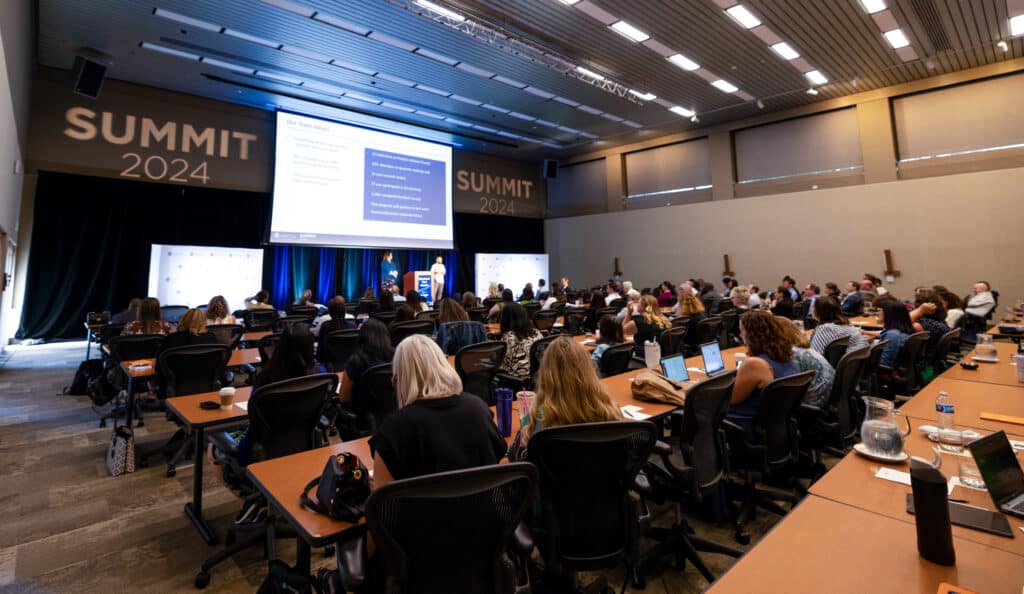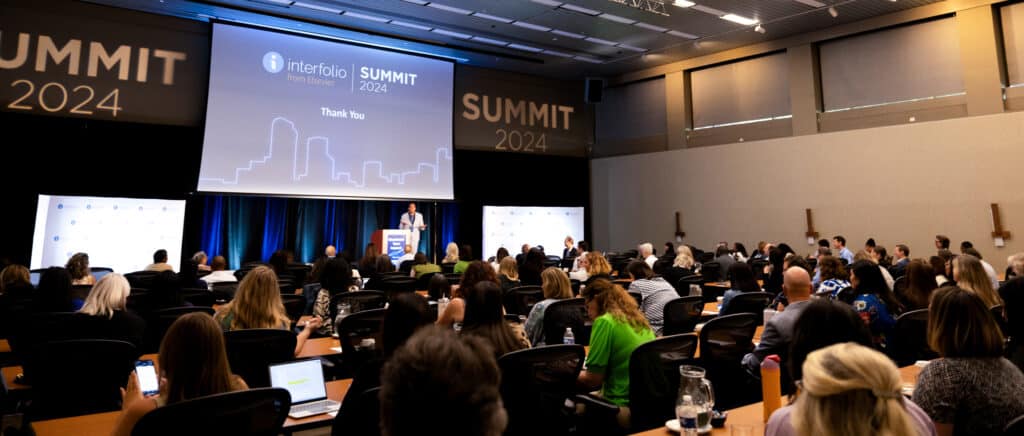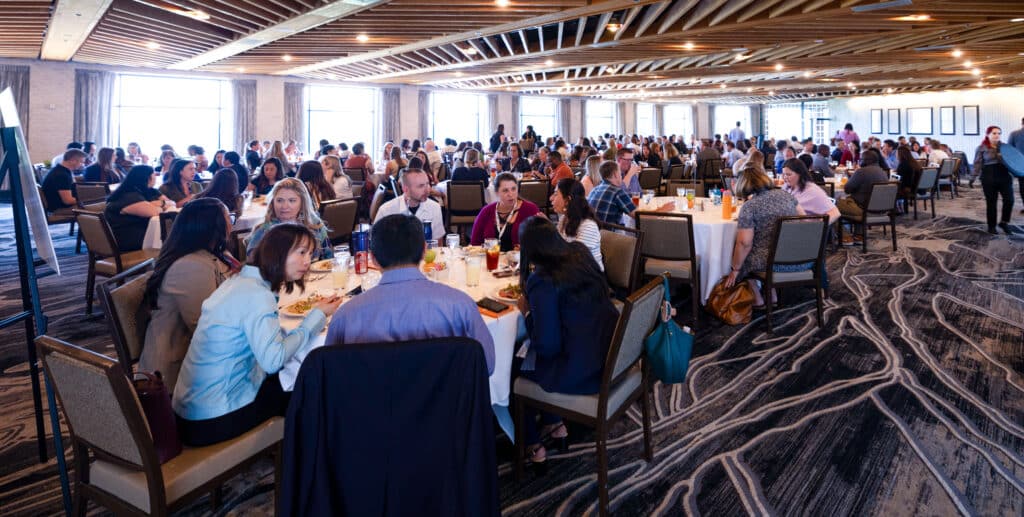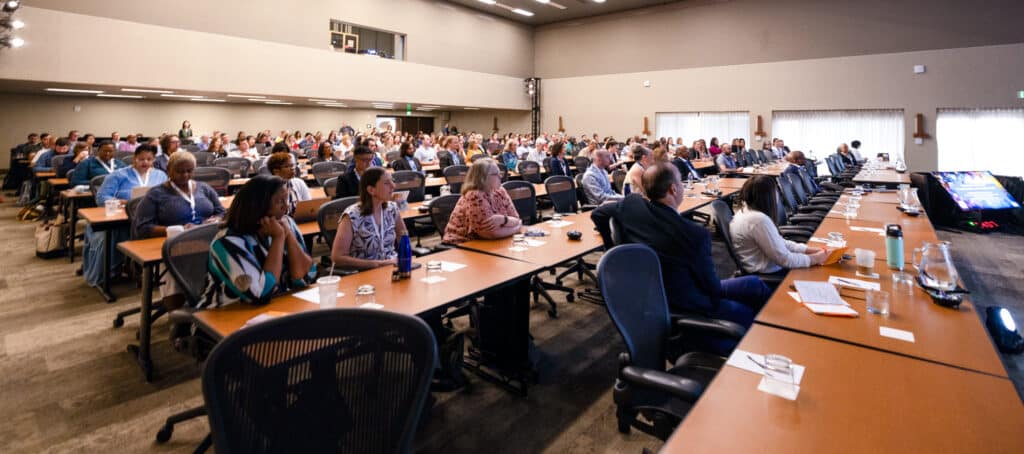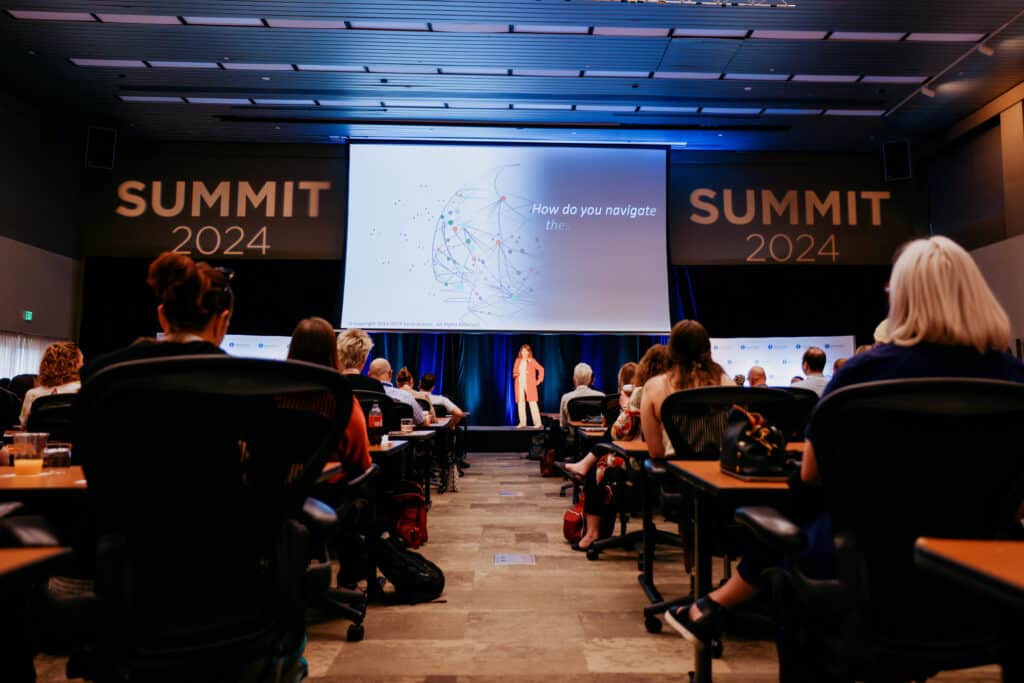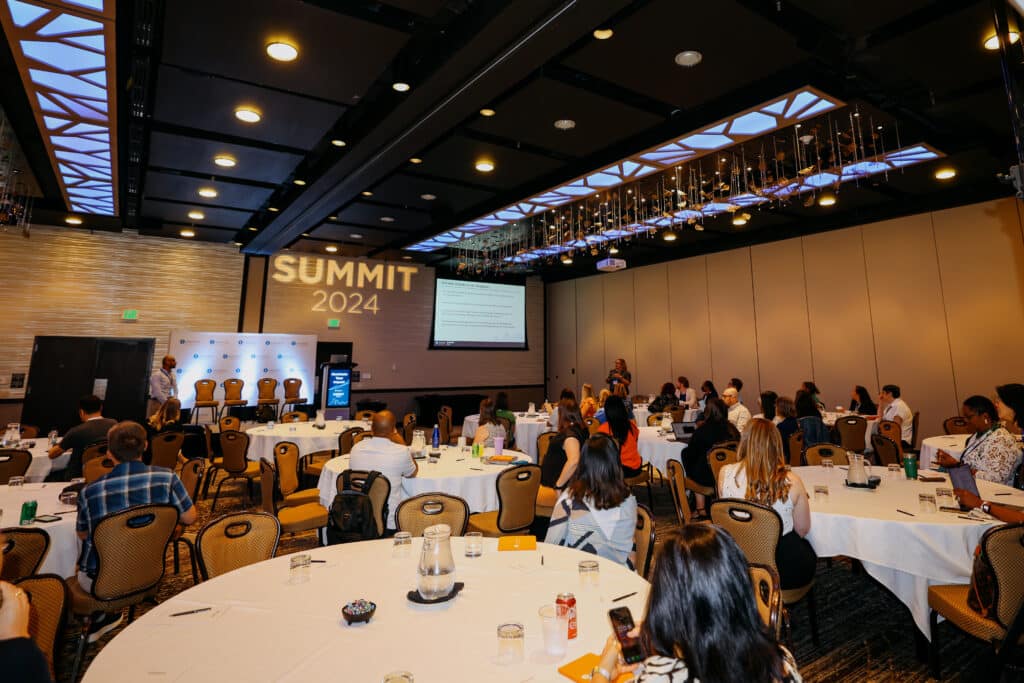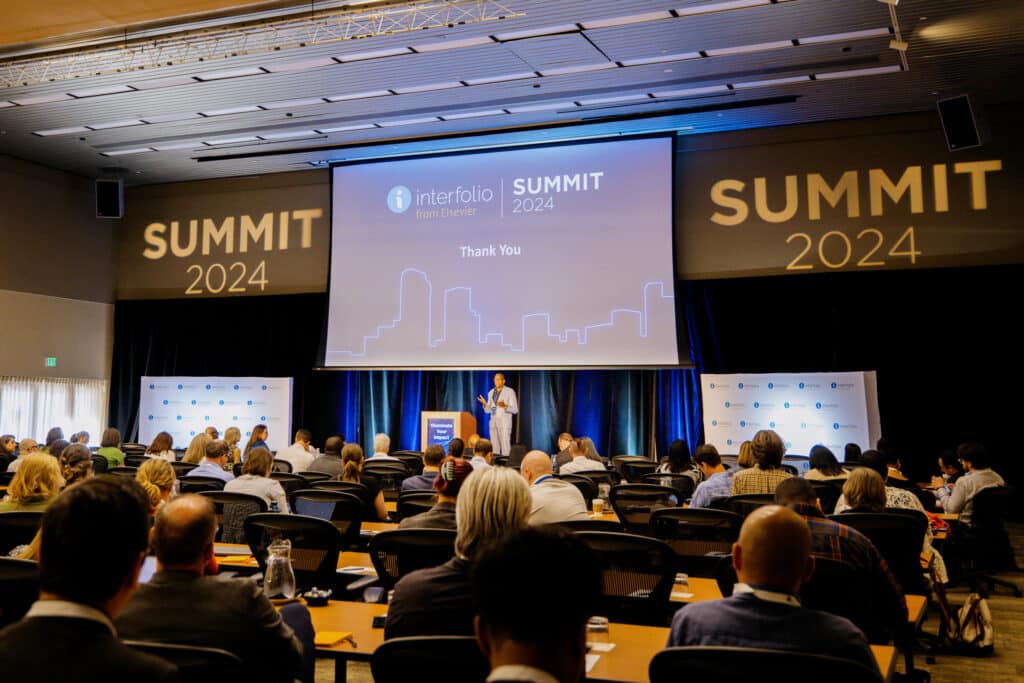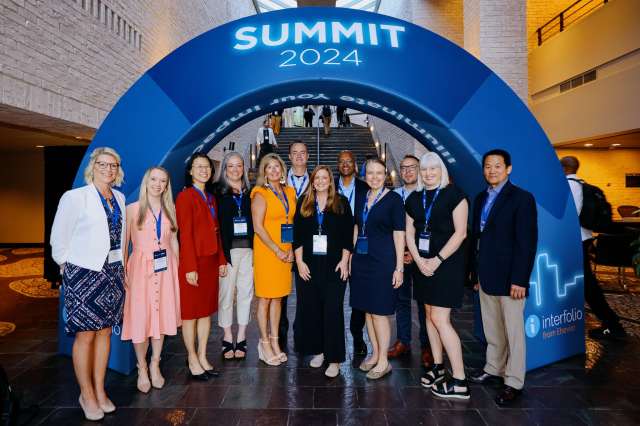At this year’s Interfolio Summit, faculty affairs professionals came together in Denver, Colorado for three days of learning, sharing, and networking. From upcoming innovations to best practices from institutions driving success and an energizing keynote from Sonia Aranza, Summit 2024 was brimming with opportunities to learn and grow.
Throughout the event, Interfolio partner institutions shared their challenges and their successes, offering greater insight into the latest happenings in faculty affairs. Here are the top takeaways from Summit 2024:
Community Connections Are Crucial
It’s an incredibly tough time in academia. The past few years have been a rollercoaster, and there seem to be new crises arising each week that need to be resolved quickly. Networking is key for higher education professionals to share their ideas and challenges—building a sense of community with those who are also in the trenches helps build knowledge, form partnerships, and drive success.
That’s why events like Summit are so important. These opportunities for networking allow faculty affairs professionals to connect with peers, share experiences, and instigate change—which is exactly what happened when Dr. Patricia Williams Dockery, Associate Vice President of Academic Affairs at Morgan State University, and Dr. Karen L. Anderson, Associate Provost for Academic Resources & Faculty Development at Yale University, struck up a conversation at last year’s Summit in Washington, DC.
Their conversation led to an initiative between Yale and eight historically black colleges and universities (HBCUs): Claflin University, Hampton University, Jackson State University, Morehouse College, Morgan State University, North Carolina A&T State University, and Tuskegee University. The Alliance for Scholarship, Collaboration, Engagement, Networking and Development (ASCEND) Initiative launched a $10M commitment to initiate research and teaching collaborations between HBCUs and predominately white institutions (PWIs).
“It was in DC last year at the Interfolio Summit that the seeds of this partnership started germinating,” shared Dr. Williams Dockery. “I was giving a presentation, had some conversations with Karen during lunch, and then we spoke further about previous projects that Morgan and Yale had done.” From there, the project grew, spreading even further to include additional HBCU institutions. “Had Karen and I not been at the Summit last year, this may not have become a reality,” she added. “Summit isn’t just about us learning how amazing the tools are—it’s also an opportunity to share best practices, make really meaningful relationships, and build networks to support the work we do as faculty affairs leaders.”
Change, Change, Change!
Hiring and retaining both faculty and staff was top of mind at this year’s event. And we heard our attendees loud and clear: The impact of personnel change on campus is significant, whether it is new leadership or a long-time staff member with deep institutional knowledge leaving. But just how tough is it to find—and hold onto—the right people?
During this year’s Summit, we were joined by the Higher Education Recruitment Consortium (HERC) for a session highlighting the results from their 2024 Job Seeker Survey. This annual survey aims to understand the experiences of both current and prospective higher ed employees and identify effective strategies for colleges and universities looking to hire and retain these essential campus constituents.
The survey revealed that an alarming 39% of faculty are actively seeking a new job, including 44% of faculty who have 10+ years of experience. And they aren’t just exploring opportunities in higher education—47% are looking at roles across many industries, including higher education, while 9% are looking to pivot from the industry entirely.
How can institutions keep existing faculty engaged in their roles while also attracting new talent? Job seekers place high importance on the ability to advance their careers internally, having shared values as their institution, and the need for flexible work options.
Growing Desire for More (and Better) Data
Data was a very hot topic this year! The common theme was that faculty affairs professionals require clean, accurate data to do their jobs well. There’s no shortage of uses when it comes to faculty data—reporting, CVs, evaluations, and even workload equity. How can institutions ensure they’re capturing everything they need?
During a deep dive into data from the IT Department at UVA’s McIntire School of Commerce, attendees learned how the institution created a multi-step process to extract data from Interfolio Faculty Activity Reporting (FAR) using an API, which is then stored, transformed, and integrated with numerous other systems. This collaborative effort between the faculty affairs and IT teams helps the institution analyze data in robust ways.
Boise State University and Texas A&M University joined forces to discuss how they use data within FAR to power faculty CVs, institutional reporting, accreditation, and more. Since beginning its FAR rollout in the summer of 2022, Texas A&M has led more than 20 training sessions to ensure success, and 85% of the institution’s faculty have utilized the system. Meanwhile, Boise State created a “Why are we doing this?” fact sheet for faculty, helping them better understand the value of using the system.
Interfolio’s Product team members also presented on this topic, sharing best practices and case studies from institutional partners who have utilized Interfolio Lifecycle Management to achieve better data governance. In addition, the team announced the launch of Interfolio Faculty Web Profiles, which gives institutions the power to highlight faculty accomplishments using data from FAR.
Continued Engagement Is Key
Many clients shared how implementing Interfolio represents an important transformation—but this takes thoughtful effort and requires faculty buy-in to ensure success. Florida Gulf Coast University (FGCU) joined us at Summit to share how the institution successfully engaged faculty to implement Interfolio.
The institution took a proactive approach to buy-in, focusing on these five strategies to help cultivate collaboration and engagement:
- Effective communication
- Continuous participation
- Intentional language
- Comprehensive training
- Transparency
This approach included involving faculty from start to finish, helping to build a positive relationship between faculty and the technology. They were consulted for their insights and perspectives—and given ongoing opportunities to provide input. Communications sent to faculty featured positive, supportive language, demonstrating the institution’s openness to improvement. In addition, faculty were provided with comprehensive training, one-on-one assistance, and easily accessible guides for additional support. And by prioritizing openness and transparency with regular meetings, timely emails, and meaningful communications, faculty were constantly kept in the loop throughout the implementation process.
“It was important to us that the faculty were part of our team—they were part of the process from the beginning to the end,” shared Andi Clemons, Director of Academic Affairs, Administration, and Budget at FGCU. “We wanted to create an environment of support,” she added. “You want them to feel comfortable, you want them to feel supported. And it does take a little bit of extra work, but it’s so worth it because they’re going to feel better about the results and the change if they feel like they’ve got support.”
Interfolio can also help with these efforts: We offer a consultative approach to help our partner institutions replicate best practices on their campus and involve the right stakeholders at the right time. Our monthly client newsletter details the latest innovations, upcoming webinars, and office hours for ongoing support and optimization. As Sonia Aranza shared during her moving keynote, “You can go fast alone, but we can go further together.” We are here to support you every step of the way.
We hope Summit was a valuable experience for everyone who attended, and we look forward to hosting again next year. If you missed this year’s event and want to learn more about the topics covered, be sure to reach out to your Account Manager or Customer Success Manager. Hope to see you in 2025!
